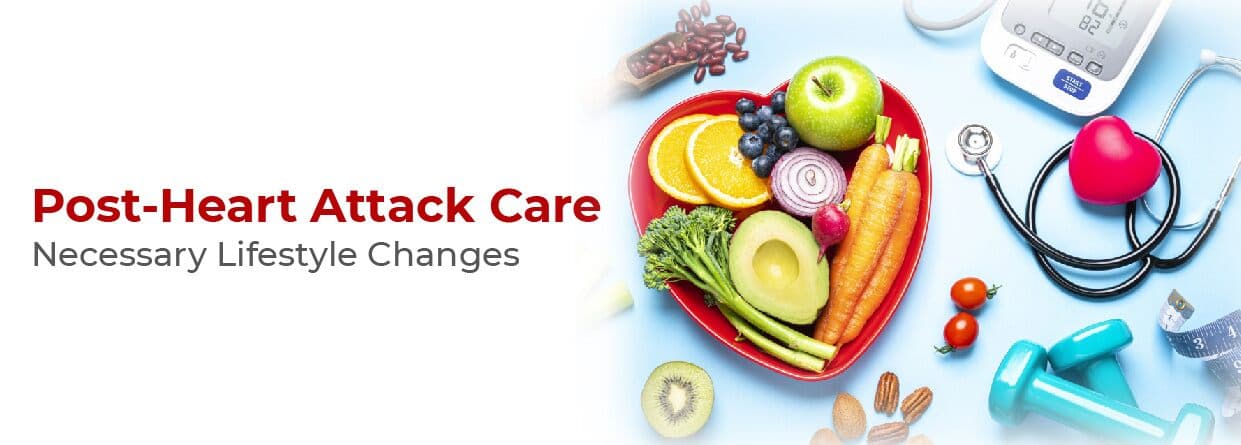
Cardiac rehabilitation (CR) is a medically supervised program, which is designed to improve the heart health of individuals with cardiac problems especially those who have suffered a heart attack. The program often includes:
It’s hard to ignore when your heart hurts!
Heart attack can be life-threatening and recovering from it is a long journey that involves making significant changes to your lifestyle. A shift from a sedentary to an active lifestyle, unhealthy to healthy, nutrient-rich food is much required to heal your heart and reduce the chances of future complications. If you are facing any heart-related issues, you can book your appointment with our best Cardiologist, at BM Birla Heart Research Center, Kolkata.
Now, let’s take a closer look at what post-heart attack care looks like and how these changes can make a difference in your recovery and long-term health.
Cardiac rehabilitation (CR) is a medically supervised program, which is designed to improve the heart health of individuals with cardiac problems especially those who have suffered a heart attack. The program often includes:
CR is linked to a reduced risk of subsequent heart events and improved quality of life. Studies show that those who take CR have 20%-30% reduction in mortality (American Heart Association).
Recovery time after a heart attack, varies depending on factors like the age of the person, their overall health as well as the severity of the attack. All in all, initial recovery takes a few weeks to a few months after which lifelong management of heart health is essential to avoid complications.
|
Phase 1 |
Phase 2 |
Phase 3 |
|
Immediate Recovery |
Short-Term Rehabilitation |
Long-Term Management |
|
It often happens within a hospital setting and the main focus is on stabilising the patient. |
It typically lasts for a few months, with gradual physical activities introduced under medical supervision. |
A lifelong commitment to lifestyle adjustments and regular check-ups. |
Eating a heart-healthy diet is crucial after a heart attack. It helps reduce cholesterol, blood pressure, and other risk factors.
Key Dietary Tips:
|
Food Category |
Recommended Choices |
Foods to Avoid |
|
Proteins |
Fish, poultry, beans |
Red meats, processed meats |
|
Fats |
Olive oil, avocado, nuts |
Butter, lard, fried foods |
|
Carbohydrates |
Whole grains, oats |
Refined grains, sugary snacks |
|
Fruits & Vegetables |
Any fresh fruit or vegetable |
Canned fruits in syrup |
Regular physical activity is vital for heart health, but it’s essential to start gradually and follow medical guidance.
Guidelines for Post-Heart Attack Exercise:
Note: Always consult a doctor before starting any exercise program.
After a heart attack, regular monitoring is essential to prevent complications and keep track of your progress. This includes:
Recovery after a heart attack requires a commitment to lifestyle changes that protect your heart and overall health. By following cardiac rehabilitation, focusing on a heart-healthy diet, engaging in regular physical activity, and keeping up with medical check-ups, you can support a strong and resilient heart.
You can always reach out for expert advice at BMB, Kolkata, where our healthcare team believes in providing the best of both expertise and care that you need. For any queries, Call Us: 08062136585 book your appointment
You can typically start with light activities, such as walking, a week or two after a heart attack. Consult your doctor for a tailored plan based on your condition.
Smoking constricts blood vessels, raises blood pressure, and increases heart rate, putting additional strain on the heart. Quitting can significantly reduce the risk of another heart attack.
Limit foods high in saturated fats, trans fats, and sodium. Avoid red meats, fried foods, and processed items. Instead, focus on heart-healthy foods rich in fibre, lean protein, and healthy fats.
Written and Verified by:

Dr. Ashok B. Malpani is a Senior Consultant in Cardiology Dept. at BM Birla Heart Hospital, Kolkata, with over 34 years of experience. He specializes in complex angioplasty, primary angioplasty, and pacemaker implantation.
Similar Cardiology Blogs
Book Your Appointment TODAY
© 2024 BMB Kolkata. All Rights Reserved.